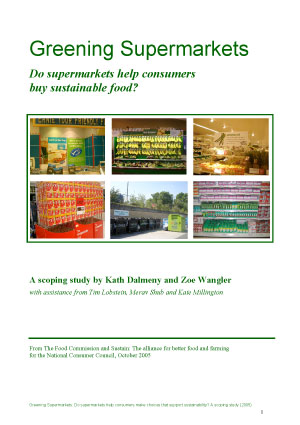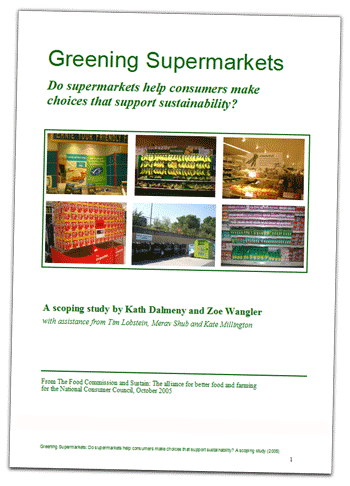
Greening Supermarkets: Do supermarkets help consumers buy sustainable food?
219pp - 2005 | 4800Kb

Greening Supermarkets: Do supermarkets help consumers buy sustainable food?
219pp - 2005 | 4800Kb
 In-depth research into the policies and practices of UK supermarkets on sustainability. This report was commissioned as a scoping study for the National Consumer Council, to help them develop a series of influential in-store surveys examining how well leading UK supermarkets help their customers to understand and buy sustainable food and other products.
In-depth research into the policies and practices of UK supermarkets on sustainability. This report was commissioned as a scoping study for the National Consumer Council, to help them develop a series of influential in-store surveys examining how well leading UK supermarkets help their customers to understand and buy sustainable food and other products.
Undertaken by staff from The Food Commission and Sustain: The alliance for better food and farming, this study examined appropriate means for measuring and rating supermarkets for their behaviour and progress on key themes of importance to sustainability. A range of measures were considered appropriate for a shopping survey. The report also contains a review of supermarket sustainability policies and a survey of other information or data available in the public domain. The broad themes covered are as follows:
The report contains many illustrations, data tables and photographs of contemporary products, labelling and marketing activites. The 219-page report also serves as a useful snapshot of supermarket progress on sustainability in 2005, which Sustain has made available for researchers wishing to track progress over time. The 2005 report led to the following surveys and reports from National Consumer Council (an organisation that has since disbanded):
Report contents
Supermarkets, health and sustainability: Sustain has worked in particular with the Greening Supermarkets, Healthier Supermarkets and Race to the Top initiatives to stimulate changes in supermarket policies and practices.
Sustain
The Green House
244-254 Cambridge Heath Road
London E2 9DA
020 3559 6777
sustain@sustainweb.org
Sustain advocates food and agriculture policies and practices that enhance the health and welfare of people and animals, improve the working and living environment, promote equity and enrich society and culture.
© Sustain 2024
Registered charity (no. 1018643)
Data privacy & cookies
Icons by Icons8